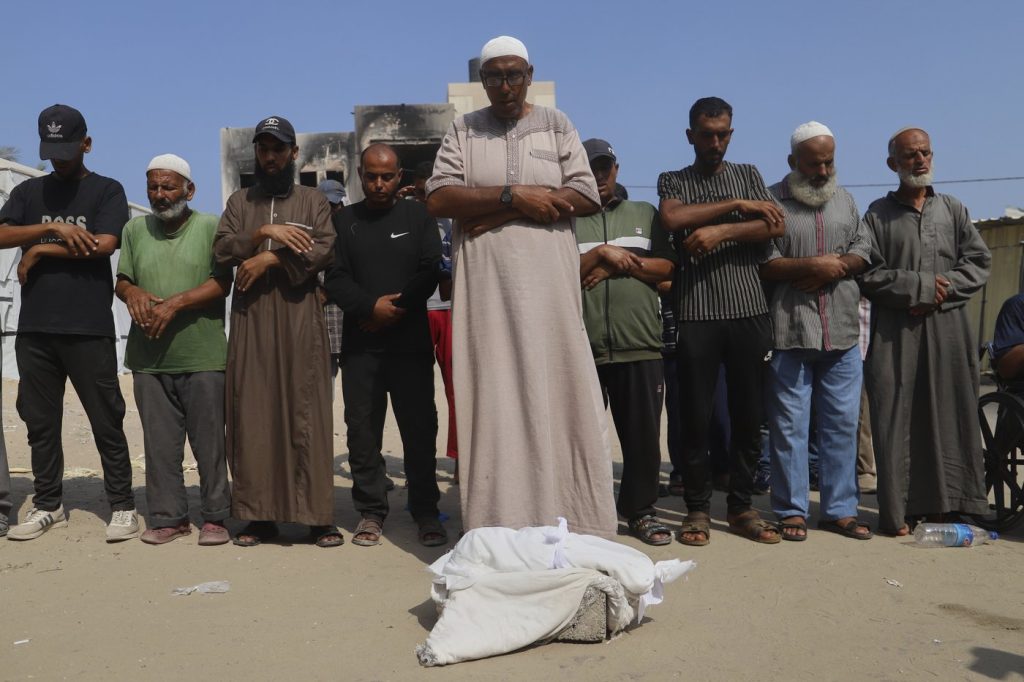KHAN YOUNIS, Gaza Strip (AP) – A mother experiencing profound grief pressed a final kiss to the remains of her 5-month-old daughter, Zainab Abu Halib, who died from severe malnutrition. The infant, who weighed less at the time of her death than at birth, has emerged as one of the tragic symbols of starvation in Gaza amid ongoing conflict and restrictions on humanitarian aid.
Zainab was brought to the pediatric department of Nasser Hospital in Khan Younis, where she was pronounced dead. A morgue worker, now tasked with the heartbreaking responsibility of preparing her for burial, was struck by her frail condition, noting that her weight had plummeted from over 3 kilograms (6.6 pounds) at birth to less than 2 kilograms (4.4 pounds) by the time of her passing. The doctor attending to Zainab described her situation as one of “severe, severe starvation.”
Wrapped in a simple white sheet for her funeral, Zainab's small body, barely wider than the imam's stance, was prepared for burial. Her father, Ahmed Abu Halib, revealed that his daughter required a special baby formula that is unfortunately unavailable in Gaza. Dr. Ahmed al-Farah, head of the pediatric department, confirmed that Zainab was not suffering from any diseases but that the absence of this crucial formula led to chronic diarrhea and vomiting, which in turn compromised her immune system, resulted in a bacterial infection, and led to her swift decline.
Since the onset of conflict, Zainab is one of 85 children reported to have died from malnutrition-related causes in Gaza within just three weeks, according to the territory's Health Ministry. Additionally, there were also reported deaths of 42 adults due to similar malnutrition-related ailments. Zainab's mother, who also faced malnutrition herself, tragically stated, “With my daughter’s death, many will follow. Their names are on a list that no one looks at.”
The increasing number of children presenting with malnutrition in Gaza has alarmed medical professionals. Dr. al-Farah highlighted that his department, designed to accommodate only eight beds, has been providing care for approximately 60 cases of acute malnutrition, forcing them to place additional mattresses on the floor to manage the influx. Another malnutrition clinic affiliated with the hospital reports an average of 40 new cases weekly.
Medical professionals and humanitarian workers in Gaza attribute the rising malnutrition and related deaths to Israel's restrictions on humanitarian aid and essential medical supplies. They warn that unless border crossings are opened to allow food and formula into the war-torn region, the number of fatalities will reach unprecedented levels.
The blockade of Gaza intensified after the end of the most recent ceasefire in March, with Israel suspending the entry of food, medicine, and fuel for over two months, citing a need to pressure Hamas to release hostages. Under growing international pressure, there was a slight easing of the blockade in May, during which around 4,500 trucks were allowed to pass for distribution by the U.N. and other aid organizations. However, this volume is still significantly lower than the 500 to 600 trucks daily deemed necessary by the U.N. to adequately meet the needs of Gaza’s population, estimated at over 2 million people.
The U.N. additionally reported an inability to distribute much of the incoming aid due to chaotic conditions with hungry crowds seizing supplies upon arrival. Meanwhile, a U.S.-registered non-profit organization, the Gaza Humanitarian Foundation, opened several food distribution centers, although reports indicate over a thousand Palestinians have lost their lives during clashes around these aid sites since May.
As the mother of Zainab expressed her sorrow, she lamented, “There was a shortage of everything. How can a girl like her recover?” Her words echo the sentiments of many families across Gaza, where the dire humanitarian situation continues to deteriorate amidst ongoing conflict.











